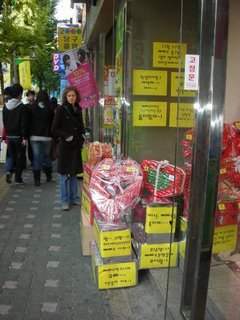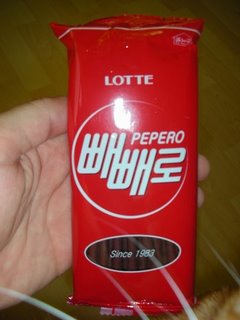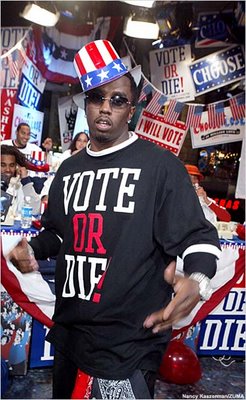 I recently had the esteemed honor of attending the Korea Institute of Finance's (KIF) Annual Symposium. This year's Symposium marked the KIFs 15 year anniversary. Like any other arbitrarily assigned anniversary celebration, this conference was a big deal. I guess 15 is a good 'round' number - but it's definitely no 25. The KIF pulled out all the stops.
I recently had the esteemed honor of attending the Korea Institute of Finance's (KIF) Annual Symposium. This year's Symposium marked the KIFs 15 year anniversary. Like any other arbitrarily assigned anniversary celebration, this conference was a big deal. I guess 15 is a good 'round' number - but it's definitely no 25. The KIF pulled out all the stops.  From the grand reception to the luncheon to the superstar international celebrities to the neat little 3-ring binders, no expense was spared. They even had those cool translator channel radio tuners and earpieces like you see in news footage of the UN.
From the grand reception to the luncheon to the superstar international celebrities to the neat little 3-ring binders, no expense was spared. They even had those cool translator channel radio tuners and earpieces like you see in news footage of the UN. Among the eminent dignataries and VIPs were the IMF's Dr. Raghuram Rajan and Dr. Stijn Claessens, the world's foremost expert on financial services sector corporate governance reform. Sounds utterly scintillating, right? Of course, wtih this kind of star power, the paparazzi devoted countless photogs (1),
Among the eminent dignataries and VIPs were the IMF's Dr. Raghuram Rajan and Dr. Stijn Claessens, the world's foremost expert on financial services sector corporate governance reform. Sounds utterly scintillating, right? Of course, wtih this kind of star power, the paparazzi devoted countless photogs (1),  dispatched innumerable video cameras (2) and assigned dozens (5) reporters from international (local) news networks. For me, the highlights of the event were the hotel luncheon (formal Western meal) and the reception (open bar). Oh, and the deeply insightful presentations on financial sector reform and the future of economic growth in Korea blah, blah, blah.
dispatched innumerable video cameras (2) and assigned dozens (5) reporters from international (local) news networks. For me, the highlights of the event were the hotel luncheon (formal Western meal) and the reception (open bar). Oh, and the deeply insightful presentations on financial sector reform and the future of economic growth in Korea blah, blah, blah.
 The luncheon was particularly enjoyable due to the fact it was one of the few meals of recent memory where, relative to my tablemates, I knew what the hell I was doing.
The luncheon was particularly enjoyable due to the fact it was one of the few meals of recent memory where, relative to my tablemates, I knew what the hell I was doing.I had a good mind to use the opportunity to extol the virtues of the formal place settings and Western table ettiquette and traditions,
but when folks grabbed forks on their right and looked


quizzically at the tiny knife just north of their plate and eschewed to them what seemed to be extraneous silverware, I decided to just keep quiet and enjoy the free meal.
Now, I've been to enough meetings, conferences, receptions in my day to know how these things work. And the KIF "15th Anniversary Symposium on Finance and Economic Growth in Korea" was pretty standard. There were, as would be expected, a few uniquely Korean variations.

 Most prominently, perhaps, the open bar served only Jack, scotch and wine. Not so open, after all. The Empire never made it to this peninsula, so don't expect to find any gin over here. Another notable difference was the showmanship. The organizers of the event were not content to have a KIF executive or staffer serve as the master of ceremonies. No, the KIF contracted with a corporate event announcer - a professional emcee. Now, I'm sure this exists in the occident as well as the orient, but it was totally new to me. In any case, I was mesmerized by his voice. His smooth tone and well-inflected delivery suggested a failed career in radio broadcasting. Can't you just imagine him starting out as a promising college radio dj, getting hired by the top station in Seoul, then being involved in some scandal, probably a result of an on-air gaffe and getting relegated to piddly corporate events work, introducing total strangers at receptions and awards banquests, barely eeking out a meager living, biding his time until he can make that one last run toward radio fame?
Most prominently, perhaps, the open bar served only Jack, scotch and wine. Not so open, after all. The Empire never made it to this peninsula, so don't expect to find any gin over here. Another notable difference was the showmanship. The organizers of the event were not content to have a KIF executive or staffer serve as the master of ceremonies. No, the KIF contracted with a corporate event announcer - a professional emcee. Now, I'm sure this exists in the occident as well as the orient, but it was totally new to me. In any case, I was mesmerized by his voice. His smooth tone and well-inflected delivery suggested a failed career in radio broadcasting. Can't you just imagine him starting out as a promising college radio dj, getting hired by the top station in Seoul, then being involved in some scandal, probably a result of an on-air gaffe and getting relegated to piddly corporate events work, introducing total strangers at receptions and awards banquests, barely eeking out a meager living, biding his time until he can make that one last run toward radio fame? 
 I just don't suppose this job is the ultimate career for aspiring vocal talent. But hell, for all I know this guy is Korea's answer to Billy Crystal. Really, though, he had some great pipes.
I just don't suppose this job is the ultimate career for aspiring vocal talent. But hell, for all I know this guy is Korea's answer to Billy Crystal. Really, though, he had some great pipes.




























